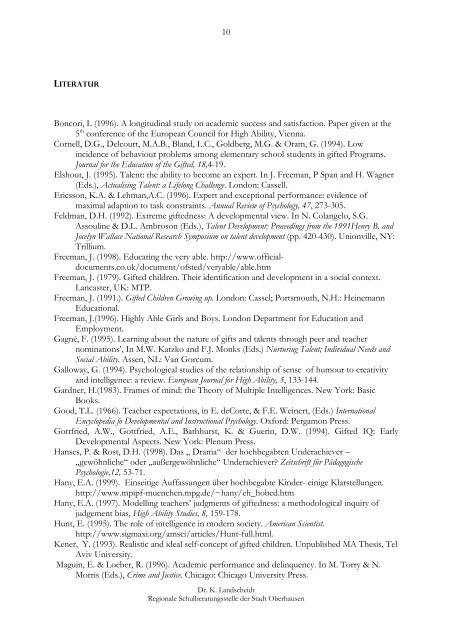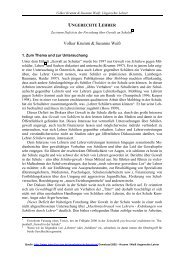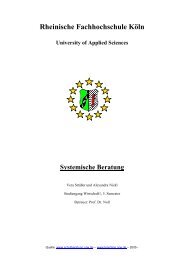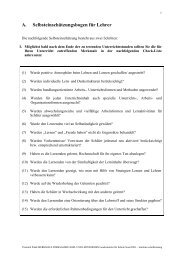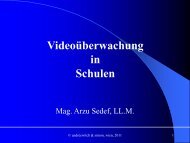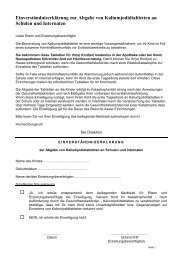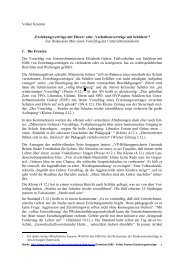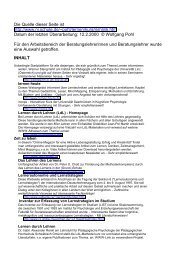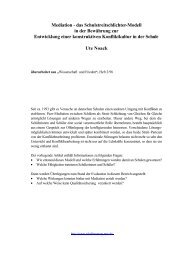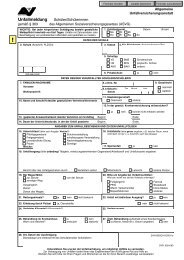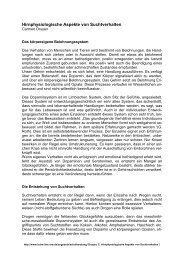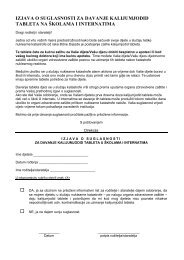Begabung und Hochbegabung
Begabung und Hochbegabung
Begabung und Hochbegabung
Sie wollen auch ein ePaper? Erhöhen Sie die Reichweite Ihrer Titel.
YUMPU macht aus Druck-PDFs automatisch weboptimierte ePaper, die Google liebt.
LITERATUR<br />
10<br />
Boncori, L (1996). A longitudinal study on academic success and satisfaction. Paper given at the<br />
5 th conference of the European Council for High Ability, Vienna.<br />
Cornell, D.G., Delcourt, M.A.B., Bland, L.C., Goldberg, M.G. & Oram, G. (1994). Low<br />
incidence of behaviour problems among elementary school students in gifted Programs.<br />
Journal for the Education of the Gifted, 18,4-19.<br />
Elshout, J. (1995). Talent: the ability to become an expert. In J. Freeman, P Span and H. Wagner<br />
(Eds.), Actualising Talent: a Lifelong Challenge. London: Cassell.<br />
Ericsson, K.A. & Lehman,A.C. (1996). Expert and exceptional performance: evidence of<br />
maximal adaption to task constraints. Annual Review of Psychology, 47, 273-305.<br />
Feldman, D.H. (1992). Extreme giftedness: A developmental view. In N. Colangelo, S.G.<br />
Assouline & D.L. Ambroson (Eds.), Talent Development: Proceedings from the 1991Henry B. and<br />
Jocelyn Wallace National Research Symposium on talent development (pp. 420-430). Unionville, NY:<br />
Trillium.<br />
Freeman, J. (1998). Educating the very able. http://www.officialdocuments.co.uk/document/ofsted/veryable/able.htm<br />
Freeman, J. (1979). Gifted children. Their identification and development in a social context.<br />
Lancaster, UK: MTP.<br />
Freeman, J. (1991.). Gifted Children Growing up. London: Cassel; Portsmouth, N.H.: Heinemann<br />
Educational.<br />
Freeman, J.(1996). Highly Able Girls and Boys. London Department for Education and<br />
Employment.<br />
Gagné, F. (1995). Learning about the nature of gifts and talents through peer and teacher<br />
nominations’, In M.W. Katzko and F.J. Monks (Eds.) Nurturing Talent; Individual Needs and<br />
Social Ability. Assen, NL: Van Gorcum.<br />
Galloway, G. (1994). Psychological studies of the relationship of sense of humour to creativity<br />
and intelligence: a review. European Journal for High Ability, 5, 133-144.<br />
Gardner, H.(1983). Frames of mind: the Theory of Multiple Intelligences. New York: Basic<br />
Books.<br />
Good, T.L. (1966). Teacher expectations, in E. deCorte, & F.E. Weinert, (Eds.) International<br />
Encyclopedia fo Developmental and Instructional Psychology. Oxford: Pergamon Press.<br />
Gottfried, A.W., Gottfried, A.E., Bathhurst, K. & Guerin, D.W. (1994). Gifted IQ: Early<br />
Developmental Aspects. New York: Plenum Press.<br />
Hanses, P. & Rost, D.H. (1998). Das „ Drama“ der hochbegabten Underachiever –<br />
„gewöhnliche“ oder „außergewöhnliche“ Underachiever? Zeitschrift für Pädagogische<br />
Psychologie,12, 53-71.<br />
Hany, E.A. (1999). Einseitige Auffassungen über hochbegabte Kinder- einige Klarstellungen.<br />
http://www.mpipf-muenchen.mpg.de/~hany/eh_hobed.htm<br />
Hany, E.A. (1997). Modelling teachers’ judgments of giftedness: a methodological inquiry of<br />
judgement bias, High Ability Studies, 8, 159-178.<br />
Hunt, E. (1995). The role of intelligence in modern society. American Scientist.<br />
http://www.sigmaxi.org/amsci/articles/Hunt-full.html.<br />
Kener, Y. (1993). Realistic and ideal self-concept of gifted children. Unpublished MA Thesis, Tel<br />
Aviv University.<br />
Maguin, E. & Loeber, R. (1996). Academic performance and delinquency. In M. Torry & N.<br />
Morris (Eds.), Crime and Justice. Chicago: Chicago University Press.<br />
Dr. K. Landscheidt<br />
Regionale Schulberatungsstelle der Stadt Oberhausen


